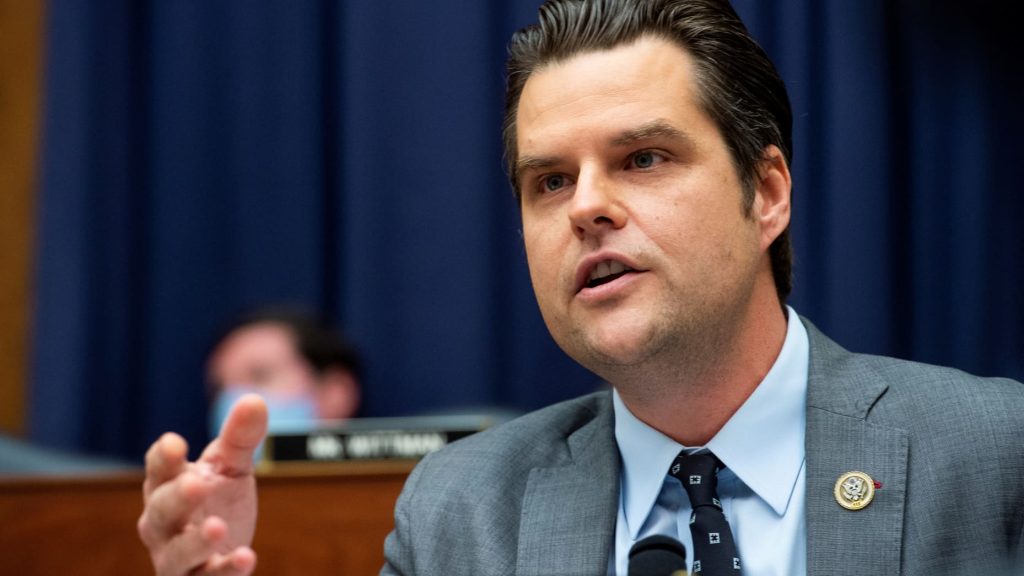Trump Faces Growing Criticism from GOP Senators Amid Support for Matt Gaetz

Former President Donald Trump is facing increasing criticism from within his party following his vocal support for Rep. Matt Gaetz amid ongoing controversies surrounding the Florida lawmaker.
Gaetz, a staunch ally of Trump and a leading figure in the House Freedom Caucus, has drawn sharp criticism from some Republican senators who are now questioning Trump’s alignment with him.
The tensions reflect the growing divide within the Republican Party as Trump continues to influence key political dynamics while party members weigh their allegiance to his brand of leadership.
Trump’s endorsement of Gaetz comes at a time when the congressman is facing heightened scrutiny over his actions and statements, both in Congress and in his personal life.
Gaetz, a vocal critic of the Biden administration and a controversial figure within the Republican Party, has faced allegations ranging from ethical violations to accusations of misconduct.
Despite the criticism, Trump has remained steadfast in his support for Gaetz, describing him as a “loyal” ally and a “fighter” for conservative values.
However, not all Republicans share Trump’s enthusiasm for Gaetz. Several GOP senators have expressed concerns about Trump’s continued backing of the congressman, with some suggesting that it could harm the party’s image heading into the 2024 elections.
These senators argue that Gaetz’s polarizing persona, combined with his legal troubles and controversial rhetoric, could alienate moderate voters who are crucial to the party’s success in swing states.
In particular, Senate Republicans who are up for re-election in battleground states have voiced worries that Gaetz’s support could make it harder to appeal to independent and centrist voters.
One senator who has publicly criticized Gaetz is Sen. Mitt Romney of Utah, who has long been an outspoken critic of Trump.
Romney, who has consistently stood at odds with Trump on issues ranging from foreign policy to the handling of the January 6th Capitol attack, has suggested that Gaetz’s controversial behavior and statements reflect poorly on the Republican Party as a whole.
Other moderate Republicans have echoed Romney’s sentiments, urging their colleagues to distance themselves from figures like Gaetz who they feel could further damage the party’s reputation.
The growing divide over Trump’s support for Gaetz underscores a broader struggle within the Republican Party, where factions are increasingly at odds over the direction of the party and the influence of its most prominent figures.
On one hand, Trump remains a powerful force within the GOP, with his endorsement still highly coveted by many Republican candidates, particularly those who embrace his populist, America-first ideology.
On the other hand, a significant number of Republicans, particularly those in more centrist or swing districts, are wary of the divisiveness that Trump and his allies have brought to the party.
Despite the criticism from some GOP senators, Trump’s base of support remains largely loyal to him, and his endorsement continues to carry significant weight within the party.
Gaetz, who has built a strong following among conservative voters, is unlikely to be deterred by the criticisms coming from Senate Republicans. Gaetz has used the controversy to his advantage, framing himself as a victim of political elites and a champion of conservative values in the face of establishment resistance.
For Gaetz, Trump’s support provides a solid foundation as he continues to push his agenda and position himself as a leader in the populist wing of the party.
The ongoing tension between Trump and the more moderate factions of the GOP raises important questions about the future of the Republican Party as it heads into the 2024 election cycle.
The party faces significant challenges in attempting to balance the desires of its base with the need to appeal to a broader electorate.
As the GOP grapples with internal divisions, the influence of Trump and figures like Gaetz will likely remain a defining issue in the party’s strategy moving forward.
Looking ahead to the 2024 elections, Senate Republicans are already strategizing on how to maintain control of the Senate, with many acknowledging that they will need to win over independent voters in key swing states.
The growing criticism of Gaetz and Trump’s continued support for him could complicate those efforts, especially in states like Arizona, Georgia, and Pennsylvania, where moderate voters are crucial to securing victories.
At the same time, Trump’s influence over the party remains undeniable, and any attempt to distance themselves from the former president risks alienating his loyal supporters, who are a significant force within the GOP.
In conclusion, the increasing tensions between Trump and GOP senators over Matt Gaetz highlight the deepening divides within the Republican Party. As the party navigates its internal divisions and prepares for the 2024 elections, the influence of figures like Trump and Gaetz will play a key role in shaping the party’s strategy and messaging.
While Trump’s endorsement continues to be a powerful asset for many Republicans, the growing criticism from moderates within the party suggests that the GOP may need to reconcile its populist base with more centrist elements if it hopes to achieve success in the upcoming elections. How the party navigates this divide could have lasting implications for its future.






